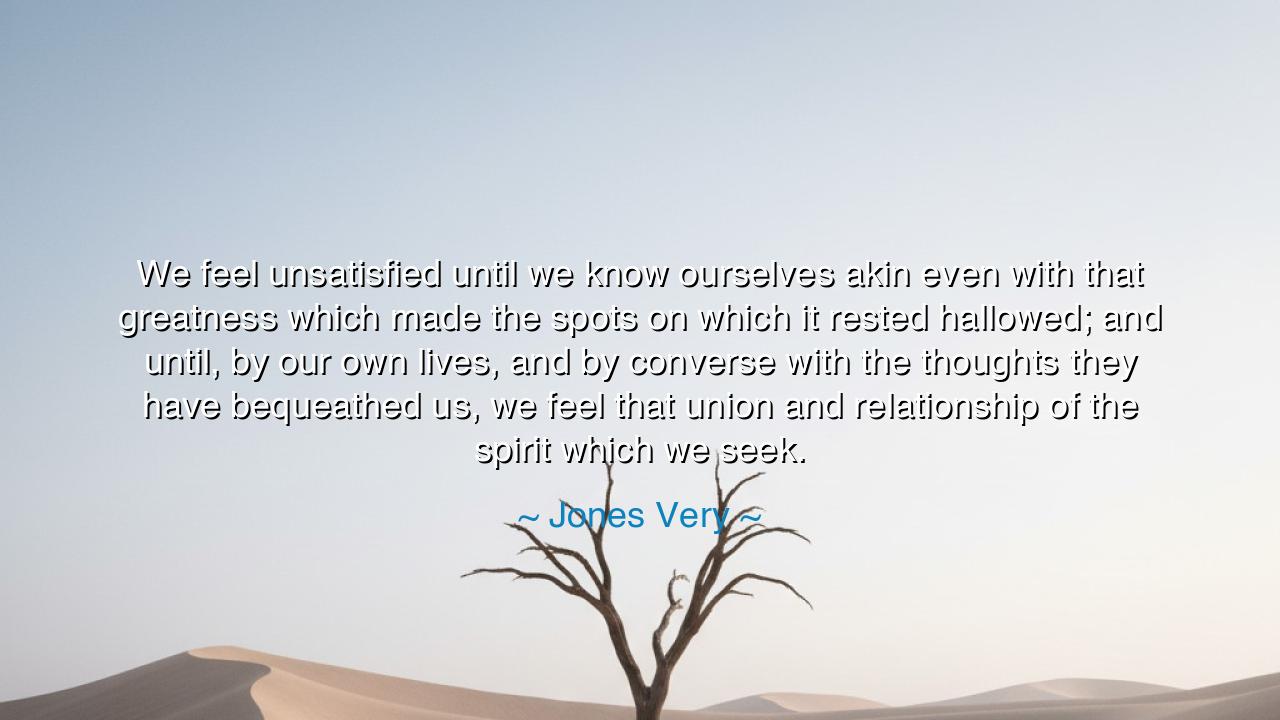
We feel unsatisfied until we know ourselves akin even with that
We feel unsatisfied until we know ourselves akin even with that greatness which made the spots on which it rested hallowed; and until, by our own lives, and by converse with the thoughts they have bequeathed us, we feel that union and relationship of the spirit which we seek.






In the profound words of Jones Very, “We feel unsatisfied until we know ourselves akin even with that greatness which made the spots on which it rested hallowed; and until, by our own lives, and by converse with the thoughts they have bequeathed us, we feel that union and relationship of the spirit which we seek,” there lies a meditation on the soul’s yearning for connection with something eternal. Man is not content with the fleeting and the small; his heart longs to touch the same greatness that shaped the world before him. This greatness lingers in sacred places, in the echoes of noble deeds, and in the enduring words of those who have passed, leaving behind a trail of light for others to follow.
The origin of this truth is found in the ancient traditions of reverence and memory. From the temples of Greece to the groves of the Druids, people have hallowed certain places, not for their stones or soil, but because greatness once dwelled there. Heroes, philosophers, and prophets walked those paths, and their thoughts and lives transformed mere earth into something sacred. Very reminds us that the human spirit yearns to feel akin to these noble ones, to bridge the gap between the living and the departed through contemplation and imitation.
To achieve this, one must engage not only in remembrance but in converse with the wisdom they have left behind. Books, teachings, and traditions are not relics to be admired from a distance, but voices with which we may commune. When we shape our own lives with purpose and virtue, we forge a living dialogue between past and present. Through this, we discover the union of souls across time, a relationship of the spirit that transcends death and decay.
Thus, Very’s words speak to the eternal human quest for meaning. We walk through hallowed places not merely to honor the past, but to awaken in ourselves the same fire that once burned in those who came before. When we live nobly and engage deeply with their thoughts, we become part of an unbroken chain of greatness, joining our spirits to the vast, eternal chorus of humanity. In this union, the restless heart at last finds peace.






LTlinh truong
Jones Very’s quote made me think about how often we search for meaning and connection, but struggle to find satisfaction. He seems to suggest that true satisfaction comes when we align ourselves with a greater purpose or history. But how do we make that connection real? Is it through introspection, or by engaging with the ideas and values that have shaped our world? I wonder how many of us are still in search of that 'union of spirit' without even knowing it.
PTPhuc Thinh
I find this quote by Jones Very incredibly thought-provoking. It’s almost as if he’s suggesting that our sense of purpose is tied to understanding and connecting with something greater—be it through the places we’ve been or the thoughts of those who came before us. But does this connection always require us to know the greatness he’s speaking of, or is it something that unfolds gradually over time? How do we cultivate this union of spirit in our everyday lives?
MKNguyen Minh Khang
This quote really speaks to the idea of seeking a deeper connection to something larger than ourselves. Jones Very suggests that true contentment comes when we recognize the greatness that surrounds us and how it shapes us. But do we only feel this satisfaction once we truly understand it, or is the search itself part of the process? How does one truly feel the union of spirit Very describes—through self-reflection, action, or a mix of both?
HHaMie
Jones Very’s words are incredibly profound. It seems like he’s saying that true fulfillment comes when we understand ourselves in relation to something greater—whether that’s a person, an idea, or even history itself. How do you think this understanding happens? Is it through reflection on our past and the wisdom passed down to us, or through actively seeking out this connection? I wonder if many of us feel this deep dissatisfaction because we haven’t fully grasped that union of spirit.